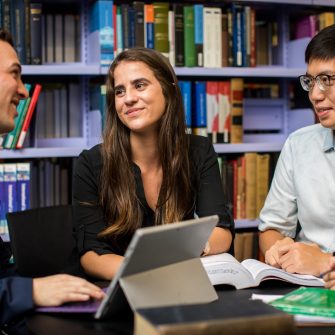Master of War Studies (Canberra)
- Commencing Terms
- Semester 1 & 2
- Duration
- 1 Year(s)
- Delivery Mode
- Online
- Campus
-
Canberra
- Codes
- Program code 8571
- CRICOS code -
-
2026 Indicative first year full fee
- $36,000*
-
2026 Indicative full fee to complete degree
- $36,000*
-
2026 Indicative first year full fee
- $50,500*
-
2026 Indicative full fee to complete degree
- $51,500*

- Overview
- Entry requirements
- What will I study?
- Future careers
- How to apply
- Fees & Scholarships
Overview
The Master of War Studies at UNSW Canberra is an interdisciplinary program that will deepen your understanding of war’s complex nature and impact on states and societies. You’ll explore concepts of war from historical, political, philosophical and sociological perspectives and examine the causes, conduct and consequences of warfare across time.
Engage with diverse conceptual and methodological approaches to the study of war, applying political, social and cultural lenses to understand its effects on history and society. This program is ideal for history teachers, postgraduate scholars and professionals in Defence, government and policy roles who seek to expand their expertise in military history and conflict studies.
Key features
Gain a multidisciplinary perspective
Examine war from historical, political, philosophical and sociological perspectives, gaining a holistic understanding of conflict and its effects on societies and states.
Tailored to your interests
With a mix of core and elective courses, you can tailor your studies to focus on areas such as military history, international security or the sociopolitical impacts of war, based on your interests and career goals.
Optional research project
High-achieving students have the option to undertake a research project, allowing for in-depth study on a specialised topic and ideal preparation for further academic research or professional expertise.
Why study at UNSW Canberra?
Expertise in Defence and security studies
UNSW Canberra is recognised for its excellence in Defence, military and security studies, providing you with unique insights from leading academics and experienced professionals in these fields.
Proximity to industry contacts
Located in Australia’s capital, UNSW Canberra offers unparalleled access to Defence, government and policy networks, enhancing learning opportunities and opening doors to potential career pathways.
Flexible study options
Designed with working professionals in mind, this program offers a variety of online and part-time options, allowing you to balance study with professional commitments.
Want to see more from UNSW Canberra at ADFA?
Entry requirements
Please refer to the UNSW Handbook for the Entry Requirements.
English language requirements
You may be asked to provide evidence of your English proficiency to study at UNSW depending on your educational background and citizenship. English language skills are vitally important for coping with lectures, tutorials, assignments and examinations - this is why UNSW requires a minimum English language competency for enrolment.
If you’re completing an Australian Year 12 qualification (e.g. NSW HSC or equivalent), you do not need to provide anything extra to prove your proficiency. Your qualification will be used as evidence of your English proficiency.
If you do need to provide evidence of your English proficiency, this will be indicated in your application. You can prove this by providing evidence that you meet one or more of the following criteria:
- English language tests and university English courses
- Prior study in the medium of English
- Other qualifications
If you need to improve your English skills before you start your degree, UNSW College’s Academic English Programs are for you. The programs are suitable for various English levels and help you prepare for university studies and life in Australia.
For more details, visit the English Language Requirements page.
Please refer to the UNSW Handbook for the Entry Requirements.
English language requirements
You may be asked to provide evidence of your English proficiency to study at UNSW depending on your educational background and citizenship. English language skills are vitally important for coping with lectures, tutorials, assignments and examinations - this is why UNSW requires a minimum English language competency for enrolment.
If you’re completing an Australian Year 12 qualification (e.g. NSW HSC or equivalent), you do not need to provide anything extra to prove your proficiency. Your qualification will be used as evidence of your English proficiency.
If you do need to provide evidence of your English proficiency, this will be indicated in your application. You can prove this by providing evidence that you meet one or more of the following criteria:
- English language tests and university English courses
- Prior study in the medium of English
- Other qualifications
If you need to improve your English skills before you start your degree, UNSW College’s Academic English Programs are for you. The programs are suitable for various English levels and help you prepare for university studies and life in Australia.
For more details, visit the English Language Requirements page.
What will I study?
UNSW is introducing a new academic calendar from 2028.
We are moving to a new flex-semester calendar. What does this mean for your studies?
Program structure
Students undertaking the Master of War Studies are required to complete eight courses (48 UOC), with at least four courses (24 UOC) taken from those in the core course list. The core courses will normally be offered annually or at least every two years; the further options will be offered on an opportunity basis.
Full program structure
The Master of War Studies consists of 8 courses (48 UOC) and can be completed entirely online in a year. Students must complete:
Core courses – At least 12 UOC
● Representations of War
● Genocide: Perception and Intervention
● The Development of the Art of War: A Survey
Prescribed electives – Up to 36 UOC
● American Empire
● War and Memory
● Strategic Communication
● Contemporary Warfare
● Foundations of Modern Strategy
● Modern Naval History and Strategy
● Fighting the Second World War
● The First World War 1914-1919
● Australian Military History: An Introduction
● The Vietnam Wars: A Thirty Year Conflict
● The History of Special Operations
● Most Secret: Intelligence in the World
● International Peacekeeping Operations
● Contemporary Strategy
● Australia and Cyber War
● Special Operations: Theory and Strategic Utility
● GRIM Threats (Guerrilla, Revolutionary, Insurgent and Militia) and Irregular Warfare
● Military Game Changers in 21st Century Warfare
Optional: Research Thesis
Students who obtain at least a Distinction average in six courses may take a 12 UOC research thesis. Enrolment is subject to approval by the Postgraduate Coordinator. See the handbook for more information.
-
- Representations of War
- Genocide: Perception and Intervention
- The Development of the Art of War: A Survey
-
- American Empire
- War and Memory
- Strategic Communication
- Contemporary Warfare
- Foundations of Modern Strategy
- Modern Naval History and Strategy
- Fighting the Second World War
- The First World War 1914-1919
- Australian Military History: An Introduction
- The Vietnam Wars: A Thirty Year Conflict
- The History of Special Operations
- Most Secret: Intelligence in the World
- International Peacekeeping Operations
- Contemporary Strategy
- Australia and Cyber War
- Special Operations: Theory and Strategic Utility
- GRIM Threats (Guerrilla, Revolutionary, Insurgent and Militia) and Irregular Warfare
- Military Game Changers in 21st Century Warfare
-
Students who obtain at least a Distinction average in six courses may take a 12 UOC research thesis. Enrolment is subject to approval by the Postgraduate Coordinator. See the handbook for more information.
Future careers
Graduates of the Master of War Studies gain specialised knowledge in military history, strategy and the complexities of global conflict. You’ll be equipped for influential roles across Defence, government, intelligence and international organisations. With skills in analysis, policy development and strategic planning, graduates are well-prepared to address the pressing security and diplomatic challenges of today.
Potential roles
● Defence Analyst
● Defence Policy Advisor
● Defence Researcher
● Diplomatic Advisor
● Government Affairs Specialist
● Intelligence Analyst
● International Relations Specialist
● Military Advisor
● National Security Advisor
● Policy Analyst
● Security Consultant
● Strategic Planner
● Threat Analyst
● War Correspondent
How to apply
Applications must be submitted through our Apply Online portal. We encourage you to submit your completed application as early as possible to ensure it will be processed in time for your preferred term. Some high-demand programs and Faculties with limited places may have an earlier application deadline or commencement date. Find out more.
Ready to start your application?
For most international students, applications are submitted via our Apply Online service. We encourage you to submit your completed application as early as possible to ensure it will be processed in time for your preferred term.
Some high-demand programs with limited places, may have an earlier application deadline or may have an earlier commencement date. For details, visit the international admissions information page.
Ready to start your application?
Fees & Scholarships
*Fees are subject to annual review (or when required) by the University and may vary accordingly.
Indicative fees are a guide only and have been calculated based on the typical enrolment patterns of students undertaking the program. The indicative fees listed here is an estimate for tuition only and excludes non-tuition fees and charges. The amount you pay will vary depending on the calendar year of enrolment, the courses you select and whether your study load is more or less than 1 Equivalent Full Time Student Load (48 units of credit (UOC) per year).
You should not rely on indicative fees as fee increases are assessed when required and may exceed the indicative figures listed here. Actual fees are calculated on enrolment. More information on fees can be found at the UNSW fees website.
*Fees are subject to annual review by the University and may increase annually, with the new fees effective from the start of each calendar year. The indicative fees listed here are based on an estimated average and are for tuition only, other fees and charges are not included. The amount you pay will vary depending on the calendar year to enrol, the courses you select and whether your study load is more or less than 1 Equivalent Full Time Student Load (8 courses per year).
Indicative fees are a guide for comparison only based on current conditions and available data. You should not rely on indicative fees. More information on fees can be found at the UNSW fees website.
Indicative fees to complete the program have been calculated based on a percentage increase for every year of the program. Fee increases are assessed annually and may exceed the indicative figures listed here.
Indicative fees to complete the program include tuition plus an estimate of study-related costs of approximately $1,000 per year. To find out more about other costs, visit UNSW International.
Scholarships
At UNSW, we award over $83 million in scholarships each year. We pride ourselves on rewarding excellence and making university accessible to students from all walks of life. Whether you’re a domestic or international student, our range of scholarships, prizes and awards can support your journey.
Progress starts here – at a world-leading university

Top 20 Worldwide
UNSW is ranked #20 university in the world
QS World University Rankings, 2024–2026

Most Employable Graduates
Winner of the AFR Most Employable University Award six years in a row
AFR Top100 Future Leaders Awards, 2020–2025

Australia's #1 for Innovation
Highest number of startups and spinouts from university-developed tech
SCOPR report, 2024




